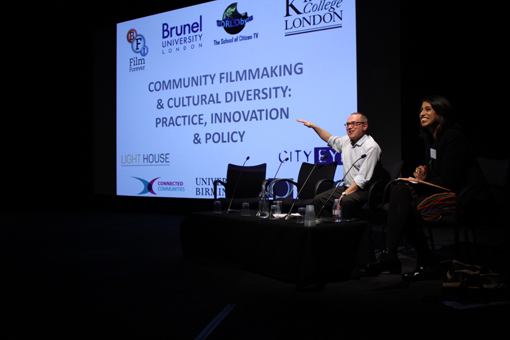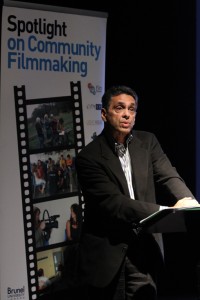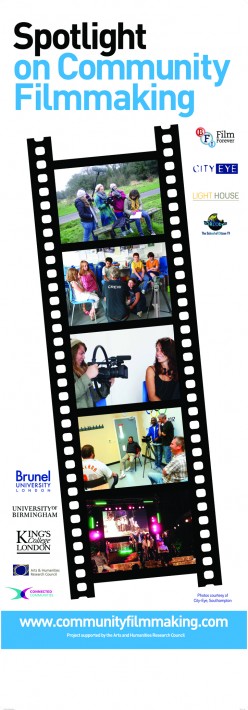Community Filmmaking and Cultural Diversity: Practice, Innovation and Policy. Sarita Malik, with Caroline Chapain and Roberta Comunian, discusses an AHRC funded project that has opened up a range of possible research avenues and partnerships between academics and community filmmakers.
About the Authors:
 Dr Sarita Malik is a Lecturer in Media and Communications in the Department of Sociology and Communications at Brunel University. She previously worked for the BBC as a Researcher, and later as an Arts Programmer specialising in Asian Arts, a research bid writer and Research Fellow on a large ESRC project exploring public understandings of regulation. Her doctoral research, based at the British Film Institute, analysed the history of Black and Asian representation on British television and was supervised by the renowned sociologist, Stuart Hall. Sarita’s academic research is focused on how social processes and systems operate in relation to ideology and inequalities, with a particular focus on the relationship between the media and cultural representation. Current projects examine cultural diversity and public service broadcasting, reality TV and discourses of equality, and black and Asian British cinema.
Dr Sarita Malik is a Lecturer in Media and Communications in the Department of Sociology and Communications at Brunel University. She previously worked for the BBC as a Researcher, and later as an Arts Programmer specialising in Asian Arts, a research bid writer and Research Fellow on a large ESRC project exploring public understandings of regulation. Her doctoral research, based at the British Film Institute, analysed the history of Black and Asian representation on British television and was supervised by the renowned sociologist, Stuart Hall. Sarita’s academic research is focused on how social processes and systems operate in relation to ideology and inequalities, with a particular focus on the relationship between the media and cultural representation. Current projects examine cultural diversity and public service broadcasting, reality TV and discourses of equality, and black and Asian British cinema.
 Dr Caroline Chapain is a lecturer at the Business School, University of Birmingham. Previously, Caroline studied and worked in France and in Canada. From 2002 to 2005, she worked as a research advisor on public finance, economic development, and cultural issues for the Montreal Metropolitan Planning Organization. Since 2005, she has been looking at the way creative industries emerge, operate and develop at the local and regional levels in the UK and in Europe. She was part of ACRE, a FP6 project which aimed to assess the impact of the emerging 'creative class' and the rise of the 'creative industries' on the competitiveness of EU metropolitan regions. She was involved in a project looking at the links between creative clusters and regional innovation in Great Britain for NESTA (the British national agency for innovation).
Dr Caroline Chapain is a lecturer at the Business School, University of Birmingham. Previously, Caroline studied and worked in France and in Canada. From 2002 to 2005, she worked as a research advisor on public finance, economic development, and cultural issues for the Montreal Metropolitan Planning Organization. Since 2005, she has been looking at the way creative industries emerge, operate and develop at the local and regional levels in the UK and in Europe. She was part of ACRE, a FP6 project which aimed to assess the impact of the emerging 'creative class' and the rise of the 'creative industries' on the competitiveness of EU metropolitan regions. She was involved in a project looking at the links between creative clusters and regional innovation in Great Britain for NESTA (the British national agency for innovation).
 Dr. Roberta Comunian is Lecturer in Cultural and Creative Industries at the Department for Culture, Media and Creative Industries at King's College London. She previously worked at the University of Kent and at the University of Southampton. She holds a European Doctorate title in Network Economy and Knowledge Management. She is interested in: relationship between public and private investments in the arts, art and cultural regeneration projects, cultural and creative industries, creativity and competitiveness. She has been Marie Curie Fellow at University of Newcastle (Centre for Urban and Regional Development Studies) investigating the relationship between creative industries, cultural policy and public supported art institutions.
Dr. Roberta Comunian is Lecturer in Cultural and Creative Industries at the Department for Culture, Media and Creative Industries at King's College London. She previously worked at the University of Kent and at the University of Southampton. She holds a European Doctorate title in Network Economy and Knowledge Management. She is interested in: relationship between public and private investments in the arts, art and cultural regeneration projects, cultural and creative industries, creativity and competitiveness. She has been Marie Curie Fellow at University of Newcastle (Centre for Urban and Regional Development Studies) investigating the relationship between creative industries, cultural policy and public supported art institutions.
Context of the project Led by Dr Sarita Malik (Brunel University) along with Dr Caroline Chapain (University of Birmingham) and Dr Roberta Comunian (Kings College London), this research has helped to understand better how community filmmaking practices, in culturally diverse contexts, contribute to the wider film ecology and to representation, identity and innovation.
The British Film Institute, where the final project conference was held on 22 and 23 January 2014, says that this project has helped, 'enrich our own knowledge and contact with this area of film culture.' Such was the interest in the conference that there was a waiting list!
At the conference, Malik, Chapain and Comunian presented some of the preliminary findings from the research. There was also an opportunity for academics, experts and practitioners in this field to contribute through papers, presentations and networking. With in-depth case studies conducted in three English regions, Hampshire, the Midlands and London, an important part of the project was working with community partners, City-Eye, Lighthouse and WORLDwrite and also giving them an opportunity to share and discuss their community filmmaking and also present their work at the showcase event, one of the highlights of the BFI-hosted conference.
Conference Report Drawing in delegates from a range of countries, including Spain, New Zealand and the USA, the international dimension of the project ensured that the themes around community filmmaking practice and diversity were discussed at both the local and global level.
Professor Yudhishthir Raj Isar from the American University of Paris and author of the United Nations Creative Economy Report 2013 opened the conference. In his opening keynote, entitled "Community cultural expression and human development in a global perspective", he offered a critical view on the narrow perspective that has allowed the creative economy discourse to be imposed from the Global North to the Global South. Against this sterile policy transfer, Professor Isar used examples from community filmmaking project in South America and India to highlight the value of locality and local stories. He concluded that the cultural economy should not be seen as a highway but a collection of complex multiple trajectories, which are situated and path dependent.
Isar’s powerful presentation was followed by the parallel sessions that took place in the buzzy surround of the BFI. The first panel session in NFT3 focused on the themes of ‘Film and Cultural Diversity’ which were skilfully elucidated by Daniel Ashton from Bath Spa University in his talk on how amateur filmmaking meets the quality discourse in the BBC’s Life in a Day and Britain in a Day. Marion Vartaftig from the long-established community filmmaking organisation, Manifesta, talked about how the collective has enabled forms of diverse social expression through participative filmmaking both in the UK and Paris. And finally Marta Rabikowska and Matthew Hawkins from the University of Hertfordshire and Coventry University respectively, suggested that the creative act of filmmaking was a social act and highlighted how this has informed their own research process.
Meanwhile in the Blue Room the ‘Generation and Media Participation’ session started with Edward Webb-Ingall, a writer and filmmaker, presented the case study of the community filmmaking project ‘Reframed Youth’ with a self-identified LGBTQ group of young people. Alicia Blum-Ross from the London School of Economics critically reflected on the involvement of adults in youth film community projects, as intermediaries and often leaders or facilitators. The final paper of the session by Ryan Shand from the University of Glasgow commented on the amateur documentary film Escape to Freedom (Coleman/Lanark Cine Club, 1981) and its role presenting children within the historical context of Vietnamese refugees in Scotland.

David Buckingham’s keynote after lunch linked his own extensive research on amateur media with the matter of community cinema. The esteemed Loughborough University Professor provided a ‘critique of the euphoria’ that has materialised with the notion that the masses are now taking charge of the media. Buckingham offered instead ‘a defence of banality’, including ‘banal filmmaking’ and the role of emotion, subjectivity, memory and coherence behind and in from of the camera.
In the ‘Practices, production and innovation’ presentations in NFT3, three papers explored different aspects of community film making process and their challenges. Eileen Leahy from Trinity College, Dublin talked about community film response to the disappearing social housing estates in Ireland. Daniel Mutibwa from Leeds University in an ethnographic study of social documentary film making in Britain and Germany over the period 2009-2011, brought to the fore the way filmmakers navigate the dilemma of producing such documentary films for mainstream broadcasters. Finally, Mark Dunford from the University of Brighton and Digitales, discussed various public funded digital storytelling projects in which he has been involved.

Professor Yudhisthir Raj Isar, University of Paris
The parallel session ‘Place and Community Filmmaking’ critically reflected on geographies of filmmaking and their contextual dynamics. The first paper by Shawn Sobers, Jonathan Dovey and Emma Agusita at University of the West of England considered the case study of South Blessed Community Channel in Bristol as an example of contextual platform between community, pedagogy but also entrepreneurialism. Anita Chang, from University of California at Santa Cruz presented a case study from her work as Asian/American Independent Filmmaker and reflected on the collaborative praxis behind her work but also on the importance of linking the past and the losses experienced with contemporary communities. Finally, Anwar Akhtar, Director of The Samosa and Jane Barnwell from the University of Westminster discussed the RSA Pakistani Calling project, reflected on the educational value of engaging students in community filmmaking but also on the role of community filmmaking in bridging across national boundaries and its use for conflict resolution, citizenship and integration.
Charles Davis from the Roger Communication Centre in Canada provided the first keynote paper on Day Two of the conference, looking at the issue of diversity in screen media in Canada. Whilst diversity is a fundamental element of Canadian media policy, the industry is characterised by white males in position of power and self-reinforcing networks with little acknowledgment of de-facto exclusionary practices.
The subsequent panel session attempted to tackle head-on the ways in which film might be regarded as a ‘radical tool’. This session was particularly rich for the film excerpts that were screened and how these were set within the cultural and political contexts within which they emerged. Deirdre O'Neill from InsideFilm and the University of Ulster talked about the importance of considering class as a specific community that also intersects with important debates around cultural diversity. David Montero from the University of Seville gave a fascinating insight into the "Indignados" movement and participatory filmmaking on the Internet. Orson Nava spoke from the position of a practitioner, about race, youth culture and media participation and proposed that clear industry routes needs to be developed for existing cultural forms engaged in by many young Black communities.
The penultimate break-out session considered a range of perspective on ‘Gender and sexual politics’. Nandini Sikand from Layafette College, USA critically engaged with the concept of collaboration. Highlighting the problematic reality of many community filmmaking projects in the Global South turning ‘misery into entertainment’ she reflects on how often there is a blurred line between ethnographer and ethnographic subject. Similarly Sarah Marie Wiebe from University of Victoria highlighted the value of community filmmaking in allowing people to ‘speak up and act out’ and enhances situated knowledge, in the context of a youth group in a highly polluted place. The final paper from Helen Wright representing the filmmaking collective ‘Lock Up Your Daughters Filmmaking’ reflected on the relationship between queerness and community filmmaking.
Concurrently, the ‘Engaging communities through film’ panel contrasted two modes of community film making practices and environment between the US and the UK. The presentation by Chi Do on the work of the Independent Television Services created by an Act of Congress in the United Stated in 1989 alluded to the legitimacy and stability that national legislation can bring to community film making production and dissemination. In contrast, the presentation by Karen Gabay and Heather Nicholson on an inter-generational project combining archives footage with contemporary interviews highlighted the difficulties of conducting such community film making projects in the UK.
 Although the conference explicitly dealt with a range of international concerns throughout the sessions, the focus of this particular session was on identity and representational politics of community filmmaking in the UK. Steve Presence of the University of the West of England discussed his efforts to develop a Radical Film Network, triggered by the groundswell in community filmmaking organisations in the political domain. Nick Higgins, Director of the University of the West of Scotland's Creative Media Academy shared his experience of leading on the fascinating Northern Lights Documentary Film Project and its resonance for Scottish identities. Kirsten Macleod also from the University of the West of Scotland (and Edinburgh Napier University) developed these themes by stressing how community media as a form of participatory practice allows people to mediate their own identities; thus the idea that community media is a process, which is also deeply connected to ideas of place. The session closed with Rob Coley from the University of Lincoln who explored how disconnection might be utilised as a catalyst that involves change.
Although the conference explicitly dealt with a range of international concerns throughout the sessions, the focus of this particular session was on identity and representational politics of community filmmaking in the UK. Steve Presence of the University of the West of England discussed his efforts to develop a Radical Film Network, triggered by the groundswell in community filmmaking organisations in the political domain. Nick Higgins, Director of the University of the West of Scotland's Creative Media Academy shared his experience of leading on the fascinating Northern Lights Documentary Film Project and its resonance for Scottish identities. Kirsten Macleod also from the University of the West of Scotland (and Edinburgh Napier University) developed these themes by stressing how community media as a form of participatory practice allows people to mediate their own identities; thus the idea that community media is a process, which is also deeply connected to ideas of place. The session closed with Rob Coley from the University of Lincoln who explored how disconnection might be utilised as a catalyst that involves change.
The Community Politics, Social Innovation and Space parallel final session started by a reflexive presentation from Alistair Scott from Edinburgh Napier University on the way Scottish working class communities have been represented in the television documentary over the last 35 years. The rest of the session focused on the role and use of film making as a tool in researcher and designer practices. Paola Briata and Enrico Masi from University College London and the University if Bologna respectively, who explained how they have used film making to undertake a representation from the inside of the multi-ethnic community of Dalston in the East of London to better inform urban planning processes in the area. Finally, Elisa Bertolotti from the Politecnico di Milano presented how designers from the DESIS lab have used videos to document, study, communicate, visualise projects, promote dialogue and shame and amplify ideas to support their design work and generate social innovation.
Impact of the project Research around innovation and cinema has tended to focus on the mainstream film value chain, with the role of innovation in culturally diverse community filmmaking contexts still under-developed. More broadly, community filmmaking, as a field of enquiry, has been characterised by a lack of academic writings integrating theory and empirical fieldwork in the last ten years.
The ‘Community Filmmaking and Cultural Diversity’ project has insisted on situating developments in community filmmaking in the social, cultural and political contexts in which they are based. Recognising the complex set of cultural, economic and social relationships and engagements in community filmmaking, the research has taken a wider perspective to consider the cascade of connections which are behind community filmmakers’ engagement with communities, industries, supporting institutions and audiences and which may impact on the cultural product and experience delivered as well as in urban/local development.
A short film of the conference highlights and selected presentations can be accessed via the project website, www.communityfilmmaking.com
For enquiries about the AHRC-funded Community Filmmaking and Cultural Diversity project, please contact: sarita.malik@brunel.ac.uk